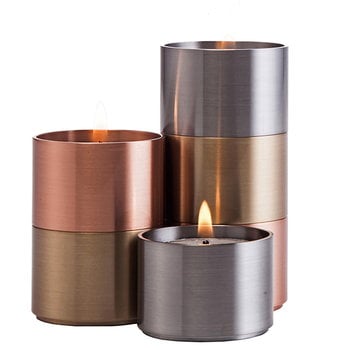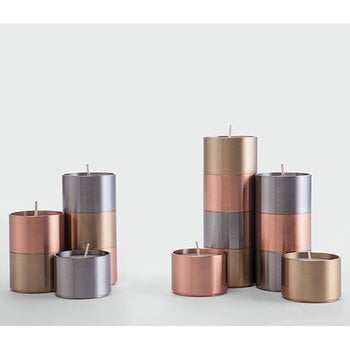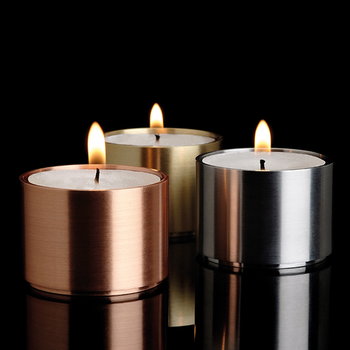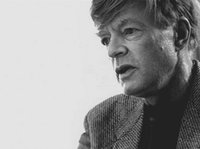Trepas Six from Architectmade is a set of six tealight holders in copper, steel and brass, designed by Peter Karpf in 1966. The candle flame will give a warm and vivid shine for the polished surfaces of the holders, and their clean, rounded shapes adorn all kinds of decors. The Trepas holders can be positioned in various different ways – arrange them on a metal tray, mantelpiece or dining table, or stack them on top of each other in a pile of two, three or several pieces.
Trepas Six tealight holders, set of 6
Architectmade
Description
Trepas Six from Architectmade is a set of six tealight holders in copper, steel and brass, designed by Peter Karpf in 1966. The candle flame will give a warm and vivid shine for the polished surfaces of the holders, and their clean, rounded shapes adorn all kinds of decors. The Trepas holders can be positioned in various different ways – arrange them on a metal tray, mantelpiece or dining table, or stack them on top of each other in a pile of two, three or several pieces.
Product details (4)
- Material
- 2 x copper, 2 x brass, 2 x steel
- Colour
- Copper, brass, steel
- Height
- 3 cm
- Diameter
- 4 cm
- Product ID
Designer
Peter Karpf (b. 1940) is a Danish designer known for his minimalist, individualist and natural style, and the use of wood and other traditional materials. After studying furniture design in the Copenhagen School of Arts & Crafts, Karpf has worked in various fields of design, including furniture, product, interior and industrial design. In 2002 Karpf was awarded with the Bruno Mathsson award, one of the most valued design prizes in Scandinavia.
View all productsReviews (0)
Sustainability
The Product Sustainability Framework, our criteria of sustainable design, helps you find the most sustainable products in our selection. Read below which sustainability criteria this product has met.
Working conditions & labour 7/9
-
Equal opportunities for all employees
-
Commitment to UN Global Compact, fair compensation for all employees
-
Corporate responsibility requirements defined and communicated for suppliers
-
Systematic work for improved inclusion and well-being in the workplace
-
Transparent supply chain
-
Suppliers' compliance to a code of conduct ensured
-
Compliance to the UN Guiding Principles on Business and Human Rights ensured in the supply chain
-
Direct suppliers audited and certified
-
Support for community involvement in the supply chain
Eco-friendly production 9/9
-
Fair and resource-wise water-use in production
-
No incineration or landfilling of returned items
-
No use of endangered species as materials
-
No direct environmental emissions or waste (excl. GHGs) from production
-
The sustainability of direct suppliers' production is addressed and monitored
-
Production and material sourcing that respect biodiversity, animal rights, and natural ecosystems
-
Material-efficient and ecological packaging
-
Positive impact on nature’s well-being through operations that regenerate natural ecosystems
-
No potentially harmful chemicals used in own production
Climate impact 5/8
-
Company's direct greenhouse gas emissions identified and commitment to reduction
-
Product's carbon impact identified and commitment to reduction
-
Guidance on energy- and eco-efficient use of the product
-
Contribution to climate initiatives beyond the brand’s direct operations
-
Low-carbon or compensated transportation
-
Carbon footprint of the product calculated and goals set to reduce it
-
100 % renewable energy in own production and operations
-
Carbon neutral or carbon negative product
Sustainable materials 6/6
-
Sustainable and long-lasting material choices
-
No harmful or hazardous substances
-
Responsible raw material sourcing and production
-
Materials suited for circularity: monomaterials, recyclable finishings, renewable or recycled contents etc.
-
Ecological materials: natural, biodegradable, recyclable or recycled contents
-
Outstanding materials in terms of innovativeness, responsibility, sustainability and circularity: local production or sourcing, 100 % recycled content, C2C-certification etc.
Circular design 5/5
-
High aesthetic quality promoting long-term use of the product
-
Technically durable product design and material choices
-
Design for enduring life-long quality
-
Design and support for product maintenance, repair and upgradability
-
Innovative circular design solutions: circular service system, resale platform, remanufacturing, collection of used products, etc.









